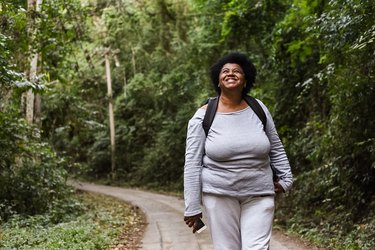
Medications might be the default treatment for many people diagnosed with anxiety. But that's not the only approach you can take. If you're looking to address your mood disorder without a prescription, you've got options.
"It is possible to treat anxiety effectively without medication," says Los Altos, California-based psychologist Catherine Athans, PhD.
Video of the Day
Video of the Day
That said, natural remedies to reduce anxiety or depression aren't always backed by science. So if you're looking to go the drug-free route, it's important to seek out alternatives that are evidence-based and talk them over with your doctor or mental health professional before giving them a try. (And never stop taking prescribed antidepressants or anti-anxiety medication without guidance from your provider.)
So what works — and what may not be worth it? Here are nine potential alternatives to anti-anxiety medication, as well as a few supplements marketed for anxiety that you may want to skip.
What Are the Symptoms of Anxiety?
Mental health statistics show that about 40 million American adults are living with anxiety, per the National Alliance on Mental Illness. This condition comes in many forms, but common symptoms include:
- Excessive, persistent fear or worry in situations that aren't threatening
- Feelings of dread
- Feeling tense, jumpy or apprehensive
- Irritability or restlessness
- Racing, pounding heart, shortness of breath and/or sweating
- Twitches or tremors
- Insomnia and fatigue
- Headaches
- Upset stomach
- Frequent urination and/or diarrhea
- Uncontrolled, repeated burping
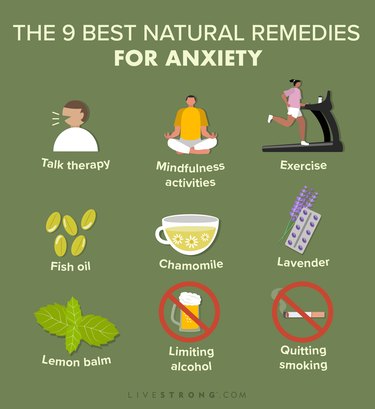
1. Talk Therapy
Psychotherapy or talk therapy sometimes goes hand in hand with medication for managing anxiety. But in some cases, "talk therapy can be enough to manage symptoms," says Los Angeles-based clinical psychologist Nancy Irwin, PsyD. The key is finding a therapist you click with and working with them to figure out which type of therapy will best meet your needs.
Cognitive behavioral therapy is one of the most popular options. It involves learning new strategies for thinking about or behaving toward situations that tend to trigger a person's anxiety, according to the National Institute of Mental Health (NIMH). In some cases, a person may need to directly confront anxiety-provoking situations that they've avoided in the past.
2. Mindfulness Activities
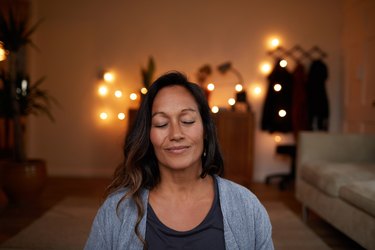
When practiced regularly, mindfulness activities like meditation or deep breathing can help a person with anxiety learn how to calm themselves down, especially when done in conjunction with talk therapy, according to the NIMH. "Meditation along with yoga may be a good combination to reduce anxiety," says Athans.
Anyone can perform these kinds of activities at home, of course, but you may reap bigger benefits by doing at-home exercises while also attending weekly group classes aimed at practicing mindfulness-based stress reduction techniques, according to the American Psychological Association (APA).
3. Exercise
Moving your body can be good for your mind. When done along with standard treatment methods like talk therapy or medication, physical activity has been shown to help people manage their anxiety, per the NIMH.
In fact, regular exercisers with anxiety disorders are less likely to be plagued by anxiety symptoms compared to their sedentary counterparts, according to a June 2019 meta-analysis in Depression & Anxiety.
Getting out for a walk or bike ride or playing tennis with a friend can help take your mind away from anxiety-producing thoughts, but there are also physiological elements at play. Boosting your heart rate ramps up the body's production of feel-good chemicals like serotonin and activates areas in the brain that control how we react to threats, according to Harvard Health Publishing.
Tip
The Physical Activity Guidelines for Americans recommend adults get at least 150 minutes of aerobic activity every week, along with two sessions of full-body strength training.
4. Fish Oil
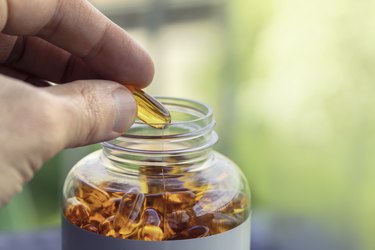
Fish oil is rich in omega-3 fatty acids, and a deficiency in this nutrient has been linked to mood disorders, according to Harvard Health Publishing. Supplementing with the nutrient might help, though.
A September 2018 review of nearly 20 clinical trials in JAMA Network Open found that people who took a high daily dose of fish oil — more than 2,000 milligrams — reported improvements in their anxiety symptoms.
You shouldn't take fish oil if you're on blood-thinning medication, as it could increase the risk of bleeding, and you should weigh the other possible side effects, including GI issues and insomnia. Talk to your doctor before adding fish oil to your regimen.
5. Chamomile
A cozy cup of chamomile tea has a reputation for being relaxing, but can it actually help manage a diagnosed anxiety disorder? While the research is limited, some data shows that short-term use of chamomile may act as an herbal remedy for anxiety, according to the Mayo Clinic. In other words, sipping this flowery tea may be a simple way to relieve anxiety quickly.
It might be especially effective as an alternative to caffeinated drinks like coffee, because caffeine can cause anxiety for some people, according to the U.S. National Library of Medicine.
But you should steer clear of chamomile if you take blood thinners, because it may increase the risk for bleeding. Proceed with caution if you have certain seasonal allergies, too — chamomile is related to common irritants like ragweed, daisies and marigold, per the Mayo Clinic.
6. Lavender
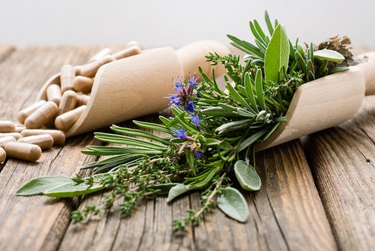
While lavender essential oil is commonly touted for its relaxation-promoting properties, oral forms of lavender may be more effective. A May-June 2020 review and meta-analysis in General Hospital Psychiatry concluded that taking 80 milligrams daily of Silexan, an oral form of lavender, can help treat long-term anxiety.
Lavender could come with side effects, though. According to the Mayo Clinic, taking oral lavender may cause constipation or headaches.
7. Lemon Balm
Here's another medicinal herb that shows potential anti-anxiety properties. Oral consumption of lemon balm (in forms such as tea or extracts) has been shown to be more effective at relieving symptoms of depression and anxiety compared to a placebo, found an August 2021 analysis in Phytotherapy Research.
The analysis didn't note any serious side effects, but lemon balm can potentially cause nausea or abdominal pain, according to the Mayo Clinic.
8. Avoiding or Limiting Alcohol
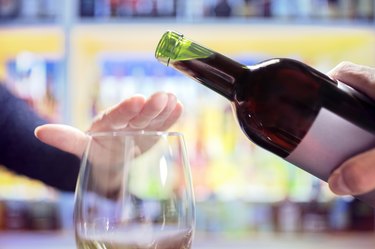
You may be tempted to steady your nerves with a drink or two, and it just might work in the short term. But in the long run, it can actually make things worse.
Alcohol can trigger anxiety for several reasons:
- It messes with mood-regulating chemicals in the brain
- Hangover symptoms can mimic anxiety symptoms (think: irritability, fatigue), sometimes known as "hangxiety"
- Heavy drinking that leads to "blacking out" can lead to anxiety over not remembering what you did or said
Related Reading
9. Quitting Smoking
Smoking is another way some people choose to self-medicate to reduce anxiety, but this approach can backfire, too.
Cigarette smoking may increase the risk of anxiety symptoms and disorders, according to a May 2013 critical review in Brain and Behavior. Chemicals like nicotine in cigarettes might affect pathways in the brain that are linked to anxiety, the authors note.
Ready to kick the habit? Check out the seven most effective strategies to quit smoking for good.
What About CBD?
CBD or cannabidiol is an active ingredient in marijuana. It won't get you high, but it's gotten a lot of attention in recent years for its potential to help ease symptoms of anxiety as well as treat other health conditions.
Most experts say that more research is needed to fully understand CBD's effects on anxiety before it can be recommended as a treatment, though. While a September 2020 review in Cannabis and Cannabinoid Research concluded that CBD shows promise for people with anxiety (particularly social anxiety), the study authors point out that there are still shortcomings in the research that make experts unable to draw firm conclusions.
And taking the stuff can come with potential negatives. It can cause side effects like dry mouth, drowsiness or diarrhea, according to the Mayo Clinic. And because products aren't tightly regulated, it can be hard to know for sure how much CBD an oil or edible actually contains. "It's difficult to endorse the use as we don't always know what we're taking," Athans says.
What About Valerian?
Herbs to calm the mind can potentially be effective, but "it requires trial and error for each individual to see which herbs work for them specifically," Irwin says. What's more, you shouldn't count on them to manage your anxiety alone. "We usually recommend them in conjunction with therapy," she adds.
Taking 600 milligrams of valerian root daily for one week reduced psychological stress in healthy adults, and an October 2020 review of seven studies in the Journal of Evidence-Based Integrative Medicine concluded that the remedy may have an anxiety-reducing effect in the brain.
But that's not enough research to say for sure whether valerian is a useful remedy for anxiety, per the National Center for Complementary and Integrative Medicine (NCCIH), especially because some other studies have found it to be no more effective than a placebo.
What's more, valerian has the potential to cause side effects, including headaches, stomachaches, heart disturbances and insomnia. Plus, Consumer Lab's testing has found that many products don't contain the amount of valerian listed on their label, and some even contain high levels of lead. So the risks may outweigh any potential benefits.
What About Kava?
Kava has been shown to have a modest effect on improving anxiety symptoms, according to the NCCIH. The problem is, it also has the potential to cause serious side effects.
Taking kava can cause headaches or dizziness and make it difficult to drive or operate heavy machinery, the NCCIH notes. Even more concerning, the herb has the potential to cause serious liver damage, even in small quantities, says the Mayo Clinic.
- National Institute of Mental Health (NIMH): "Anxiety Disorders"
- American Psychological Association: "Mindfulness meditation: A research-proven way to reduce stress."
- Depression & Anxiety: "Physical activity protects from incident anxiety: A meta-analysis of prospective cohort studies."
- Harvard Medical School: "Can exercise help treat anxiety?"
- Journal of Evidence-Based Integrative Medicine: "Valerian Root in Treating Sleep Problems and Associated Disorders—A Systematic Review and Meta-Analysis."
- National Center for Complementary and Integrative Medicine: "Valerian."
- Mayo Clinic: "CBD: Safe and effective?"
- Mayo Clinic: "Herbal treatment for anxiety: Is it effective?"
- General Hospital Psychiatry: "The best route of administration of lavender for anxiety: a systematic review and network meta-analysis."
- Phytotherapy Research: "The effects of lemon balm (Melissa officinalis L.) on depression and anxiety in clinical trials: A systematic review and meta-analysis."
- National Center for Complementary and Integrative Health: "Kava."
- Physical Activity Guidelines for Americans, 2nd Edition
- National Alliance on Mental Illness: "Anxiety Disorders"
- U.S. National Library of Medicine: "Caffeine"
- Brain and Behavior: "How cigarette smoking may increase the risk of anxiety symptoms and anxiety disorders: a critical review of biological pathways"
- Consumer Lab: "Valerian Supplements Review"
- JAMA Network Open: "Association of Use of Omega-3 Polyunsaturated Fatty Acids With Changes in Severity of Anxiety Symptoms A Systematic Review and Meta-analysis"
- Harvard Health Publishing: "Fish Oil: Friend or Foe?"
Is this an emergency? If you are experiencing serious medical symptoms, please see the National Library of Medicine’s list of signs you need emergency medical attention or call 911.